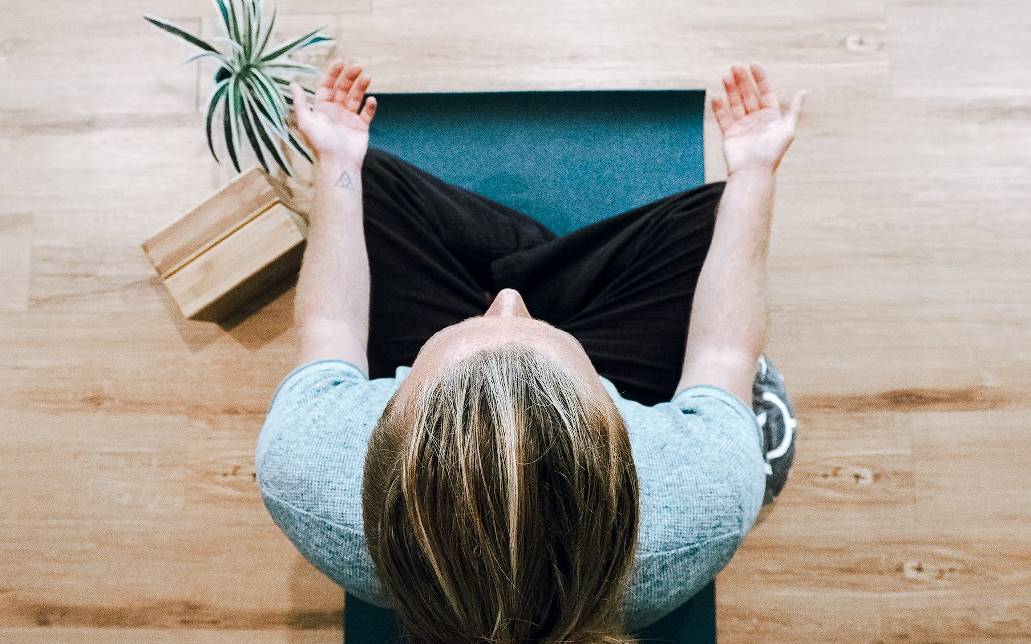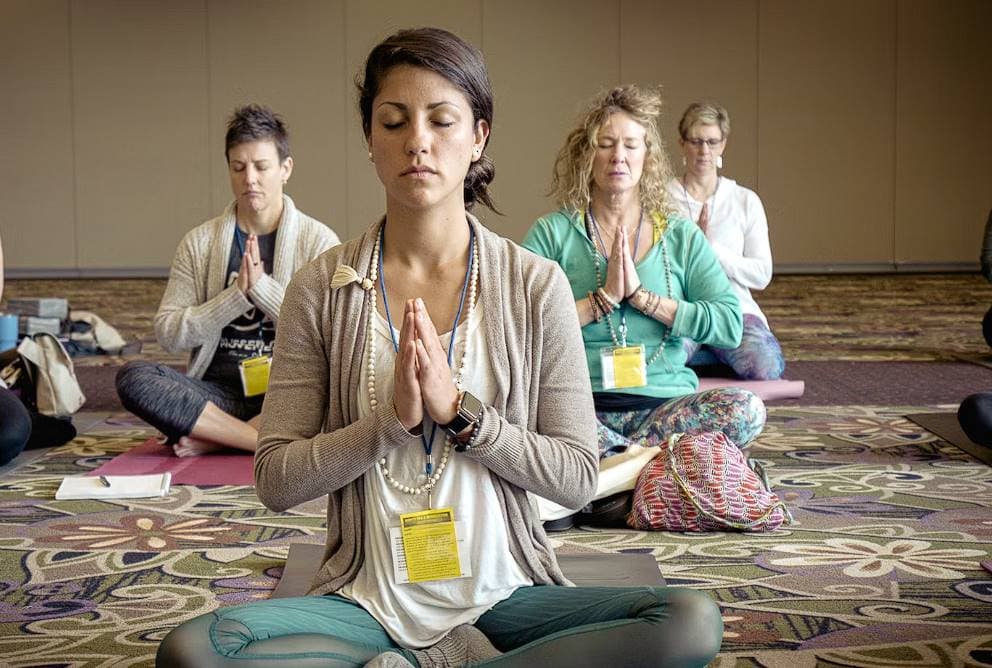If you often feel stressed, anxious, and worried, try meditation. Even if you only spend a short amount of time meditating, it can help bring back a sense of calm and inner peace.
You can meditate no matter who you are or what you're going through. It's easy to do, doesn't cost much, and doesn't require special tools. Meditation is mostly about focusing the mind for a certain amount of time.
There are many ways to meditate, but the result is usually a feeling of ease and inner peace, both good for your mental health. More and more research shows a link between meditation and mental health.
Meditation is amazing because it can be done anywhere. You can do it while taking a stroll, riding a bus, waiting at a medical facility, or even in a stressful business meeting. This practice is easy to fit into your everyday routine and may have many positive effects on your mental health.
Meditating takes the first step towards finding peace again, restoring your inner balance, and strengthening your mental strength, no matter where you are.
Meditation and Its Benefits for Our Mental Health
With worries about the pandemic, rising prices for anything from gas to goods, and political strife in Australia and worldwide, it's unsurprising that anxiety and stress are through the roof.
Meditation is a set of methods that can help you pay more attention, be more aware of your emotions, and be more kind, compassionate, and joyful even when things are hard.
Some individuals find that meditating regularly helps them be more kind to each other and others. It can also help you act less quickly when things get hard.
It's also not surprising that more individuals are searching for ways to deal with stress, ease anxiety, and enhance their quality of life. What might surprise you is that millions of people find this by meditating.

Understanding Meditation
Meditation has been done for a very long time. Meditation was first created to help people learn more about the sacred and mysterious forces of life. Meditation is often used to help people relax and feel less stressed.
Meditation is a type of medicine that treats both the mind and the body. Meditation can help you feel deeply relaxed and calm your mind.
During meditation, you pay attention to one thing and eliminate the jumbled thoughts that may make you feel stressed. This process could lead to better physical and mental health.
Elements of Meditation
Meditation can take many different forms, but the National Institutes of Health has found that most types of meditation share four things:
- An open mind that doesn't judge distractions and lets them come and go on their own.
- A narrow focus can be on a word or group of words, a thing, or even the feeling of breathing.
- A place that is quiet and has as few interruptions as possible
- A comfortable position, such as sitting, lying down, strolling, or others
Reasons for Meditating
Meditation may help you to feel at ease, relaxed, and in balance, which is beneficial for both your mental and physical health.
You might also employ it to calm yourself down and deal with anxiety by focusing on something that makes you feel better. Meditation may help you find your centre and stay at peace with yourself.
And you can keep getting these benefits even after you stop meditating. Meditation can help you go through your day with less stress. And meditation may help you deal with the symptoms of some health problems.
- Lower blood pressure: During meditation over a prolonged time in those who meditate often, blood pressure decreases. This can make blood vessels work less hard and help stop heart disease.
- Improved memory: Memory and mental sharpness may improve if you meditate regularly because it helps you focus better. These advantages can help fight the decline in memory and dementia that come with age.
- Increased attention: Meditation helps you pay more attention and keep it longer.
- Enhanced willpower: Meditation gives you the self-control to break bad habits.
- Reduced stress: Stress might go down if you meditate. It can also help with stress-related conditions like irritable intestines syndrome (IBS), traumatic brain injury (PTSD), and fibromyalgia.
- Less depression: Meditation can help make depression less likely to happen.
- Meditation helps you better understand yourself, find your best version, and feel and act more compassionately towards others.
- Less anxiety: When you meditate often, you feel less anxious. It can also help with things like social anxiety, fears, and obsessive-compulsive behaviours related to mental health.
- Better sleep: Meditation can help you fall asleep more quickly and get a better night's sleep.
- Less pain: Meditation can help you feel less pain and control your feelings better. This might help handle chronic pain when combined with medical care.
Bonus Benefits
Meditation is shown to help with IBS, fibromyalgia, and PTSD by decreasing stress levels. But that's not all that's good for your physical health. Studies have found different levels of proof that mind-body practises can help people:
- Tobacco use
- Elevated blood pressure
- Cardiovascular ailments
- Sleeplessness
- Malignancy
- Persistent discomfort
- Respiratory conditions
- Migraines
- Symptoms during menopause
Types of Meditation
Meditation is a general term for all the different ways to calm down. There are many different kinds of meditation and relaxing ways, including meditation. All of them want to find inner peace.
Some ways to meditate are:
Mindfulness Meditation
Meditation with mindfulness is the practice of being entirely present in the present moment, being mindful of where you're at and what you're doing, while actively paying focus nonjudgmentally. You can do this by meditating or being more aware and deliberate about what you do each day.
Guided Meditation
This way of meditating is referred to as guided imagery or visualisation. You make mental pictures of places or things that make you feel calm.
You try to use as many senses as possible, like smell, sight, sound, and touch. A guide or teacher may help you through this process.
Movement Meditation
Movement meditation is when you do something that is repetitive or lets you get "in the zone" and feel "flow." Structured practises include tai chi, qigong, and yoga, but any fluid motion can work.
Try meditating while stretching, walking, planting, driving, or doing everyday things like cleaning your teeth or performing the dishes. These movements can help calm the mind and allow your brain to change.
Qi Gong
This practise typically involves meditation, relaxation, physical activity, and breathing exercises in order to restore and maintain balance. Traditional Chinese medicine includes Qi Gong.
Transcendental Meditation
Transcendental practice is a meditation where people calm their minds by silently repeating a personal mantra. This method helps you keep your mind from wandering and puts you at an at-ease awareness.
Tai Chi
This is a way to learn Chinese martial arts gently. In tai chi (pronounced tie-chee), you do a series of slow, graceful poses or movements at your own pace while practising deep breathing.
Loving-Kindness Meditation
During meditation on loving-kindness, you send good, loving energy to yourself and others. People who use this technique regularly are more able to forgive, connect with others, and accept themselves.
Yoga
You do a series of poses and breathing exercises to make your body more flexible and your mind more calm. As you perform poses that require posture and focus, you are told to pay less attention to your hectic schedule and more attention to the moment.

Can Meditating Help With Anxiety?
Anxiety starts when we worry about the future or how our relationships and daily lives will go.
Meditation helps with anxiety partly because it lets you stop thinking about the past or future and instead focus on the here and now. Mindfulness meditation is all about being in the present moment.
By being aware, we can learn to stop reacting to our worries and fears and calm down the feelings that accompany them.
- Focus on your breath to start a mindfulness meditation.
- Don't criticise yourself for being worried. Once you notice them, return your attention to your breathing and repeat these steps.
- If you worry, name it but don't think about it. Instead, say to yourself, "That's a scary or sad thought," and take three long breaths.
- Be aware of the room's temperature, the sounds that are going on around you, the smells or scents in the room, and how your body reacts (sweating, having a faster heart rate, etc.).
- Pay attention to the way you feel. As you breathe in and out, be aware of how your breath moves through your nostrils and into your lungs. Feel your chest rise and fall as you breathe in and out.
- As you get a better view of the situation, you'll have a few moments of calm that will let you let go of the anxious thought. Just let it go and concentrate on your next breathing.
- After you let out your last breath, try to see the anxious thought from a different point of view. Was your concern or fear real, or did you give it more importance than deserved? Could you be making assumptions with that thought?
When you only think about the present, your mind can relax, and you can observe things from a different point of view.
Even though it's likely that the first time you try awareness, you won't be completely free of your worries, you should still feel better. If you keep working at it, you'll get better over time.
Building Your Meditation Skills
Don't criticise your meditation skills because that could make you feel more stressed. Meditation is hard at first.
Consider the fact, for example, that it's normal for your mind to wander during meditation, no matter what amount of time you've been doing it. If your mind wanders while meditating to settle it down, slowly bring it back to the object, feeling, or movement you're concentrating on.
Try different kinds of meditation, and you'll find out what works best for you and what you like doing. Adjust your meditation to what you need right now.
Always remember that there is no correct or incorrect method to meditate. What's important is that meditation helps you feel less stressed and better.
Conclusion
Meditation can help you feel calm and peaceful again, even if it's just for a short time. It is easy to do, doesn't cost much, and doesn't need any special tools.
Meditation is a set of techniques that can help you pay more attention, be more aware of your feelings, and be more kind, considerate, and happy even when things are hard. Anxiety and stress are on the rise because of worries about the outbreak, rising prices for goods, and political fighting.
Meditation is a type of medicine that helps both the mind and the body. It can help you feel very calm and deeply at ease. Most types of meditation have four things in common: an open mind, a narrow focus, a quiet place, and a comfy position.
Meditation can help you feel calm, at ease, and in tune with yourself, which is good for both your mental and physical health. Focusing on something that makes you feel better can also help you calm down and deal with worry. Meditation can help you feel less stressed during the day and deal with some health issues.
Meditation can help you lower your blood pressure, remember things better, pay more attention, have more willpower, feel less stressed, less sad, less anxious, sleep better, and feel less pain. It can also help with things like social nervousness, fears, mental health-related obsessive-compulsive behaviours, better sleep, and less pain.
Meditation also helps reduce stress, improves physical health, and lowers the risk of chronic diseases like those caused by smoking, high blood pressure, heart disease, lack of sleep, cancer, persistent pain, respiratory problems, migraines, and menopause symptoms.
Meditation is a practise that helps people calm down and find inner peace. Meditation comes in many forms, such as mindfulness meditation, guided meditation, movement meditation, Qi Gong, transcendental meditation, tai chi, loving-kindness meditation, and yoga. Mindfulness meditation includes paying attention to your breath and putting your attention on the present moment.
During guided meditation, you use different senses to form images in your mind that make you feel calm. Movement meditation, like tai chi, qigong, and yoga, involves doing the same thing over and over again. This can help you get in the zone and calm your mind.
Transcendental meditation is a way to calm your mind and keep it at ease by repeating a personal phrase. Tai Chi is a form of martial arts that is slow, smooth, and uses deep breathing.
Meditation on loving-kindness gives good energy to yourself and others, which helps you forgive, connect with others, and accept yourself. Yoga is a set of movements and breathing exercises that help you become more flexible and calm.
Meditation can help with worry because it helps you stop thinking about the past or the future and focus on the here and now. Focusing on your breath, being aware of your surroundings, and watching your breath can help you relax and see things from a different point of view. Even though you might still worry when you meditate, it can help you feel better over time.
It's important to learn how to meditate because it's normal for your mind to wander when you do. Try different kinds of meditation and change how you do it to meet your goals.
Keep in mind that there is no right or wrong way to meditate. Instead, you should find what works best for you and change your meditation to fit your needs.
Content Summary
- Meditation offers relief from stress, anxiety, and worry.
- Even short meditation sessions can restore calm and inner peace.
- Meditation is accessible to everyone, requiring no special tools or skills.
- It involves focusing the mind for a set time, leading to ease and peace.
- Research highlights the positive connection between meditation and mental health.
- Meditate anywhere - during walks, bus rides, or even business meetings.
- Incorporating meditation into daily routines benefits mental health.
- Meditating restores inner balance and mental strength.
- Meditation mitigates anxiety and stress during challenging times.
- Methods like mindfulness meditation increase awareness of emotions.
- Regular meditation promotes kindness and compassion towards others.
- It cultivates resilience and prevents impulsive reactions.
- Meditation aids in dealing with stress and anxiety effectively.
- It offers long-lasting benefits beyond the practice itself.
- Blood pressure reduction is linked to consistent meditation.
- Memory and mental sharpness improve with regular practice.
- Meditation enhances attention span and willpower.
- It aids in breaking bad habits and reducing stress.
- Meditation lowers the risk of depression occurrence.
- It fosters self-understanding and compassion towards others.
- Social anxiety, fears, and OCD symptoms can be alleviated.
- Meditation leads to better sleep and pain management.
- It provides relief for conditions like IBS, fibromyalgia, and PTSD.
- Meditation is associated with various physical health benefits.
- Different types of meditation cater to different needs.
- Mindfulness meditation encourages being present in the moment.
- Guided meditation employs visualisation for relaxation.
- Movement meditation utilises repetitive motion for tranquillity.
- Qi Gong combines meditation, relaxation, and physical activity.
- Transcendental meditation uses personal mantras for focus.
- Tai Chi offers gentle physical activity with deep breathing.
- Loving-kindness meditation promotes forgiveness and connection.
- Yoga improves flexibility and mental calmness.
- Meditation curbs anxiety by focusing on the present moment.
- Mindfulness meditation helps break the cycle of worrying.
- Awareness helps in managing anxious thoughts effectively.
- Concentrating on senses and environment aids relaxation.
- Focusing on breath fosters mindfulness.
- Naming worries without dwelling on them is effective.
- Mindfulness meditation reduces the influence of anxiety.
- Regular practice enhances mindfulness and eases worry.
- Developing meditation skills takes time, don't be critical.
- Mind wandering is normal during meditation; gently refocus.
- Experimenting with various meditation forms finds what suits you.
- Adjust meditation techniques according to your needs.
- Meditation is personal - there's no right or wrong way.
- The practice leads to reduced stress and improved well-being.
- Meditation empowers individuals to face life's challenges.
- Integrating meditation into daily life enhances overall quality.
- Meditation offers a pathway to a more peaceful, less stressed existence.
Frequently Asked Questions
Meditation improves nervous system function.
The sympathetic system controls reactions like inflammation and arousal, while the parasympathetic system controls the process that stops inflammation and makes you feel calm.
There are many ways to meditate, but most give you a sense of calm and relaxation, which can be good for your mental health. And more and more research shows that meditation is good for mental health.
Mental strength, also called emotional resilience, is how well a person can handle problems, pressure, and stress. Working on your mental strength can make you happier with your life and help you avoid mental health problems in the future.
Oxytocin, dopamine, and serotonin are chemicals in the brain that make you feel good. When you meditate, these chemicals increase, and cortisol, which causes fear and stress, decreases. Over time, this makes you feel better and less stressed.
One study also found a link between regular meditation and more laughter, empathy, and getting along with other people. Emotional intelligence is improved. Many of us have trouble figuring out how we feel. Mindfulness meditation teaches us to be more aware of and better deal with our feelings and emotions.




















